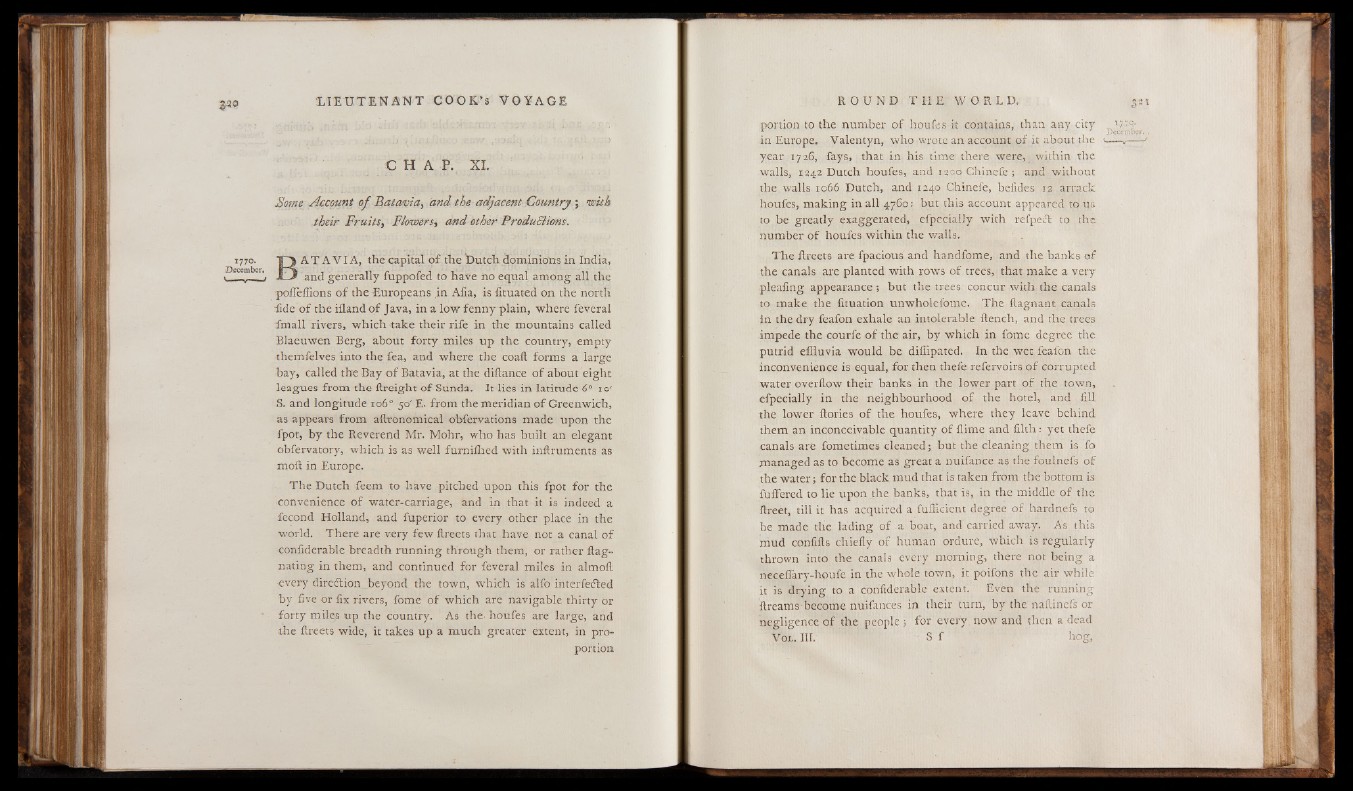
LIEUTENANT COOK’S VOYAGE
1770.
December.
C H A P. XI.
Some Account of Batavia, and the adjacent Country; 'with
their Fruits, Flowers, and ether Productions.
1 ~) A T A VI A, the capital of the Dutch dominions in India,
JL J and generally fuppofed to have ho equal among all the
pofleflions of the Europeans in Afia, is fituated on the north
fide of the ifland of Java, in a low fenny plain, where feveral
fimall rivers, which take their rife in the mountains called
Blaeuwen Berg, about forty miles up the country, empty
themfelves into the fea, and where the coaft forms a large
bay, called the Bay of Batavia, at the diftance of about eight
leagues from the ftreight of Sunda. It lies in latitude 6° 10'
S. and longitude 106° 50'E. from the meridian of Greenwich,
as appears from aftronomical obfervations made upon the
fpot, by the Reverend Mr. Mohr, who has built an elegant
obfervatory, which is as well furnilhed with inftruments as
moft in Europe.
The Dutch feem to have pitched upon this fpot for the
convenience of water-carriage, and in that it is indeed a
fecond Holland, and fuperior to every other place in the
world. There are very few ftreets that have not a canal of
confiderable breadth running through them, or rather ftag-
nating in them, and continued for feveral miles in almoft
every dirediion beyond the town, which is alfo interfedled
by five or fix rivers, fome of which are navigable thirty or
forty miles up the country. As the. houfes are large, and
the ftreets wide, it takes up a much greater extent, in proportion
ROUND THE WORLD. 391
portion to the number of houfes it contains, than any city 1 f e
in Europe. Valentyn, who wrote an account, of it about the <----„----'
year 1726, fays, that in his time there were, t| within the
walls, 1 3 4 2 Dutch houfes, and iacoChinefe; and without
the walls 1066 Dutch, and 1240 Chinefe, befides 12 arrack
houfes, making in all 4760: but this account appeared to us
to be greatly exaggerated, efpecially with refpecft to the
number of houfes within the walls.
The ftreets are fpacious and handfome, and the banks of
the canals are planted with rows of trees, that make a very
pleafing appearance ; but the trees concur with the canals
to make the fituation unwholefome. The ftagnant canals
in the dry feafon exhale an intolerable flench, and the trees
impede the courfe of the air, by which in fome degree the
putrid effluvia would be diffipated. In the wet feafon the
inconvenience is equal, for then thefe refervoirs of corrupted
water overflow their banks in the lower part of the town,
efpecially in the neighbourhood of the hotel, and fill
the lower ftories of the houfes, where they leave behind
them an inconceivable quantity of flime and filth: yet thefe
canals are fometimes cleaned; but the cleaning them is fo
managed as to become as great a nuifance as the foulnefs of
the water; for the black mud that is taken from the bottom is
fuffered to lie upon the banks, that is, in the middle of the
ftreet, till it has acquired a fufficient degree of hardnefs to
be made the lading of a boat, and carried away. As this
mud confifts chiefly of human ordure, which is regularly
thrown into the canals every morning, there not being a
necefiary-houfe in the whole town, it poifons the air while
it is drying to a confiderable extent. Even the running
ftreams become nuifances in their turn, by the naftinefs or
negligence of the people ; for every , now and then a dead
Vol. Iir. S f hog,